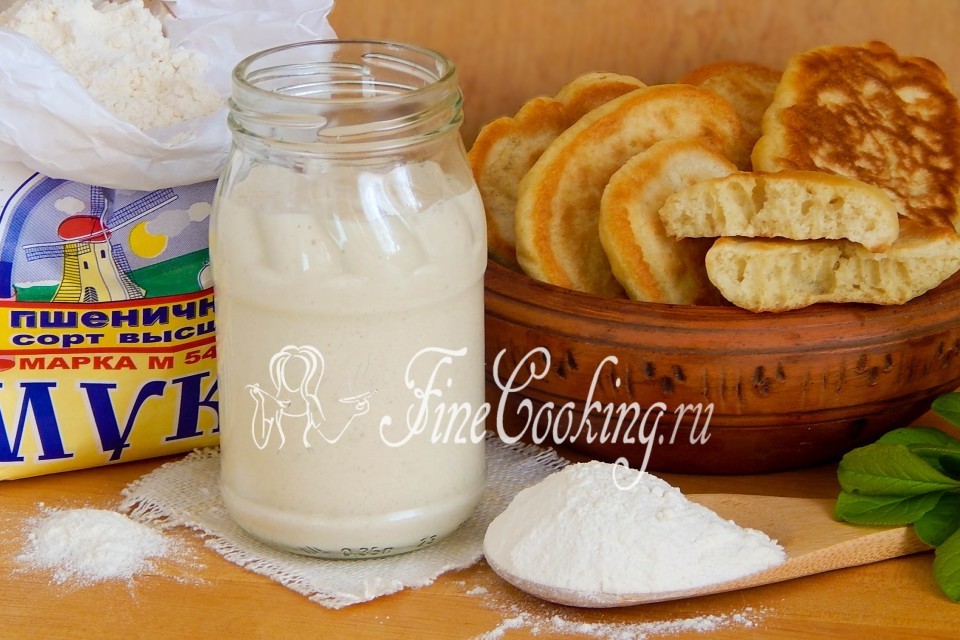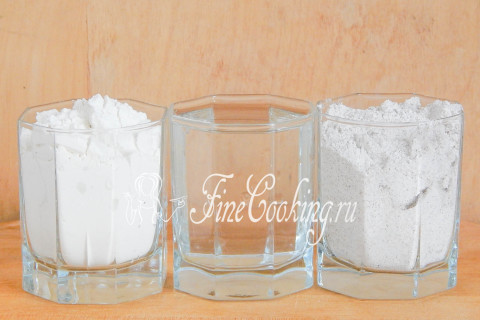Step 1
To grow wheat starter, take a liter of clean drinking water, 200 grams of rye flour and 800 grams of wheat flour. I give this amount approximately, based on the fact that the wheat starter will grow and become active in 1 day. You may need the same amount or a little more depending on the time.
Step 2
The first stage begins, which can last from 24 hours to 2 days. We take suitable containers — it is best to take a transparent glass or plastic jar with a capacity of at least 600 milliliters. Pour 100 milliliters of clean water at room temperature into it, add 50 grams of wheat and rye flour.
Step 3
Mix everything thoroughly. The result is a dough of medium thickness — like pancakes. Cover with a lid and leave in a warm place (about 27-28 degrees) for 24 hours.
Step 4
After a day, visible changes should appear: the dough will increase in volume, a smell will appear and it will be riddled with air bubbles. If this is not observed, leave the starter for another half a day. We check — if nothing happens again, leave it for another 12 hours. If nothing has changed even then, you can start again — the leaven will not work. This may depend on various factors: the quality of flour, water, temperature, and so on.
Step 5
I hope that everything is fine with you, so we move on to the second stage, which will last about 3-4 days, but sometimes a little longer. Now we will need to feed the starter with water and two types of flour: wheat and rye. That is, you will get a wheat-rye sourdough. We feed her twice a day, that is, approximately every 12 hours (morning and evening). For example, we start doing this in the morning. We take 75 grams of the entire resulting starter (the rest is not needed, we just throw it away).
Step 6
Add 75 milliliters of water to it and mix everything thoroughly. The most convenient way to do this is with a fork.
Step 7
We also pour in 75 grams of flour: 25 grams of rye and 50 grams of wheat. Mix everything until smooth, compact it, removing it from the walls. Cover with a lid and place in a warm place for 12 hours. Then we repeat everything again according to the same scheme: 75 grams of sourdough + 75 milliliters of water + 25 grams of rye flour + 50 grams of wheat flour.
Step 8
This continues for 3-4 days. The main stages of the degeneration and maturation of sourdough can be called the following: first, foaming should appear throughout the entire volume and a rather unpleasant odor. This indicates that fermentation bacteria have become active. Then the starter will begin to sour — these are lactic acid bacteria that will replace fermentation bacteria. This is why the starter may fall off and act as if it were not alive. But this is quite normal, so don’t worry — it happened to me too. This stage does not last long — we continue to feed the starter. Then the smell should change: from quite unpleasant it will become sour. Then bubbles will begin to appear — first a few at a time, and then more and more.
Step 9
It is the visible fermentation, which is observed throughout the entire volume of the starter, and an increase of 2-3 times that serves as a signal that it is time to move on to the final stage.
Step 10
Now we will also feed our starter every 13 hours, but the composition of the feed will change. We only need water and wheat flour. The scheme is as follows: 75 grams of starter + 75 milliliters of water + 75 grams of wheat flour.
Step 11
Here I decided to clearly show with the help of a marker how the starter grows 5 hours after feeding. Here she is right after she was fed flour and water.
Step 12
And here you can see that its volumes have become 2.5, or even 3 times larger. The smell of our wheat sourdough reminds me of soaked apples combined with cream — a very pleasant aroma. And thus, after 7-10 days from the start of preparation, the wheat-rye sourdough turns into pure wheat. Now you can use it to make bread, pies, buns, pies, flatbreads, pancakes, donuts.
Step 13
By the way, if you are not eager to grow wheat sourdough for so long, you can breed rye sourdough and then overfeed it. I described this in great detail in this recipe. I wish you healthy and active sourdough, my dear bakers!













